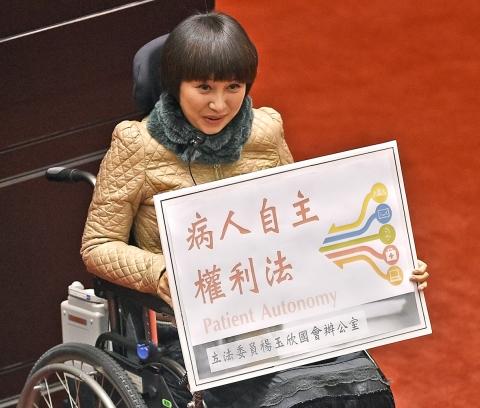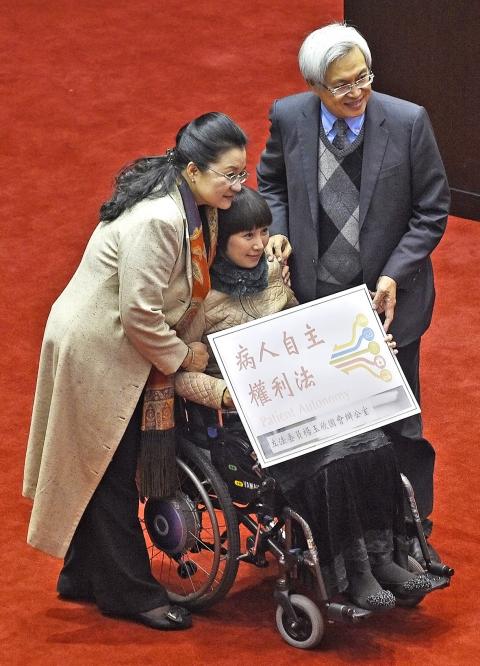The Patient Autonomy Act (病人自主權利法), which gives adult patients the right to create advance healthcare directives (AHD) regarding their preferences for medical care in the event they are rendered incapable of making such decisions, was passed by the Legislative Yuan late on Friday night.
The main focus of the legislation is to allow people with full capacity for civil conduct to create an AHD — a legal document stipulating their decisions regarding treatment they would want or not want to receive if unable to communicate their wishes — through advance healthcare consultation with physicians.
The Ministry of Health and Welfare said it was the first patient self-determination legislation passed among Asian nations, which should be a significant improvement for patients’ rights, and is to come into effect three years from now.

Photo: Chen Chih-chu, Taipei Times
In the meantime, the ministry plans to launch a pilot program and gather medical professionals to discuss the details of the act.
The legislation stipulates that before a decision can be reflected on a person’s National Health Insurance card — officially validating their AHD — the person must accept advance healthcare consultation services provided by healthcare facilities and obtain the notarized signatures of two witnesses with full capacity for civil conduct and the medical professionals on the consultation team recorded in the AHD.
Five incapacitating medical conditions can trigger the use of an AHD: a terminal disease prognosis; an irreversible coma; a permanent vegetative state; severe dementia; and government-stipulated medical conditions that result in unbearable pain or are incurable diseases with no alternative treatment.

Photo: Chen Chih-chu, Taipei Times
At least two physicians specializing in the exhibited condition and a palliative care team must confirm the condition before the AHD goes into effect.
To protect healthcare professionals that might be worried about the law, the ministry said the act stipulates that healthcare facilities or physicians can choose not to enforce the AHD based on their professional opinion, and those who terminate treatment or life-sustaining measures in accordance with an AHD would not bear criminal or civil liabilities.
In addition, the law stipulates that a patient’s family members cannot interfere with treatment provided in accordance with an AHD, the ministry said.
Chinese Nationalist Party (KMT) Legislator Yang Yu-hsin (楊玉欣), who proposed the legislation, said the act protects patients’ right to know, choose and refuse medical treatment, but does not validate euthanasia, because medical professionals are still prohibited from providing substances that would kill a patient.
While patients often need family members to consent to medical treatment in their stead, the act allows unmarried people, same-sex couples and people without families to commission an individual they trust to provide guidance on their wishes in extreme situations.
However, the opinions of healthcare professionals regarding the act are polarized, said Taiwan Medical Association director-general and KMT Legislator Su Ching-chuan (蘇清泉), who urged the ministry to discuss the details of AHD enforcement rules with specialists before the act goes into effect.

CHAOS: Iranians took to the streets playing celebratory music after reports of Khamenei’s death on Saturday, while mourners also gathered in Tehran yesterday Iranian Supreme Leader Ayatollah Ali Khamenei was killed in a major attack on Iran launched by Israel and the US, throwing the future of the Islamic republic into doubt and raising the risk of regional instability. Iranian state television and the state-run IRNA news agency announced the 86-year-old’s death early yesterday. US President Donald Trump said it gave Iranians their “greatest chance” to “take back” their country. The announcements came after a joint US and Israeli aerial bombardment that targeted Iranian military and governmental sites. Trump said the “heavy and pinpoint bombing” would continue through the week or as long

TRUST: The KMT said it respected the US’ timing and considerations, and hoped it would continue to honor its commitments to helping Taiwan bolster its defenses and deterrence US President Donald Trump is delaying a multibillion-dollar arms sale to Taiwan to ensure his visit to Beijing is successful, a New York Times report said. The weapons sales package has stalled in the US Department of State, the report said, citing US officials it did not identify. The White House has told agencies not to push forward ahead of Trump’s meeting with Chinese President Xi Jinping (習近平), it said. The two last month held a phone call to discuss trade and geopolitical flashpoints ahead of the summit. Xi raised the Taiwan issue and urged the US to handle arms sales to

BIG SPENDERS: Foreign investors bought the most Taiwan equities since 2005, signaling confidence that an AI boom would continue to benefit chipmakers Taiwan Semiconductor Manufacturing Co’s (TSMC, 台積電) market capitalization swelled to US$2 trillion for the first time following a 4.25 percent rally in its American depositary receipts (ADR) overnight, putting the world’s biggest contract chipmaker sixth on the list of the world’s biggest companies by market capitalization, just behind Amazon.com Inc. The site CompaniesMarketcap.com ranked TSMC ahead of Saudi Aramco and Meta Platforms Inc. The Taiwanese company’s ADRs on Tuesday surged to US$385.75 on the New York Stock Exchange, as strong demand for artificial intelligence (AI) applications led to chip supply constraints and boost revenue growth to record-breaking levels. Each TSMC ADR represents

State-run CPC Corp, Taiwan (CPC, 台灣中油) yesterday said that it had confirmed on Saturday night with its liquefied natural gas (LNG) and crude oil suppliers that shipments are proceeding as scheduled and that domestic supplies remain unaffected. The CPC yesterday announced the gasoline and diesel prices will rise by NT$0.2 and NT$0.4 per liter, respectively, starting Monday, citing Middle East tensions and blizzards in the eastern United States. CPC also iterated it has been reducing the proportion of crude oil imports from the Middle East and diversifying its supply sources in the past few years in response to geopolitical risks, expanding